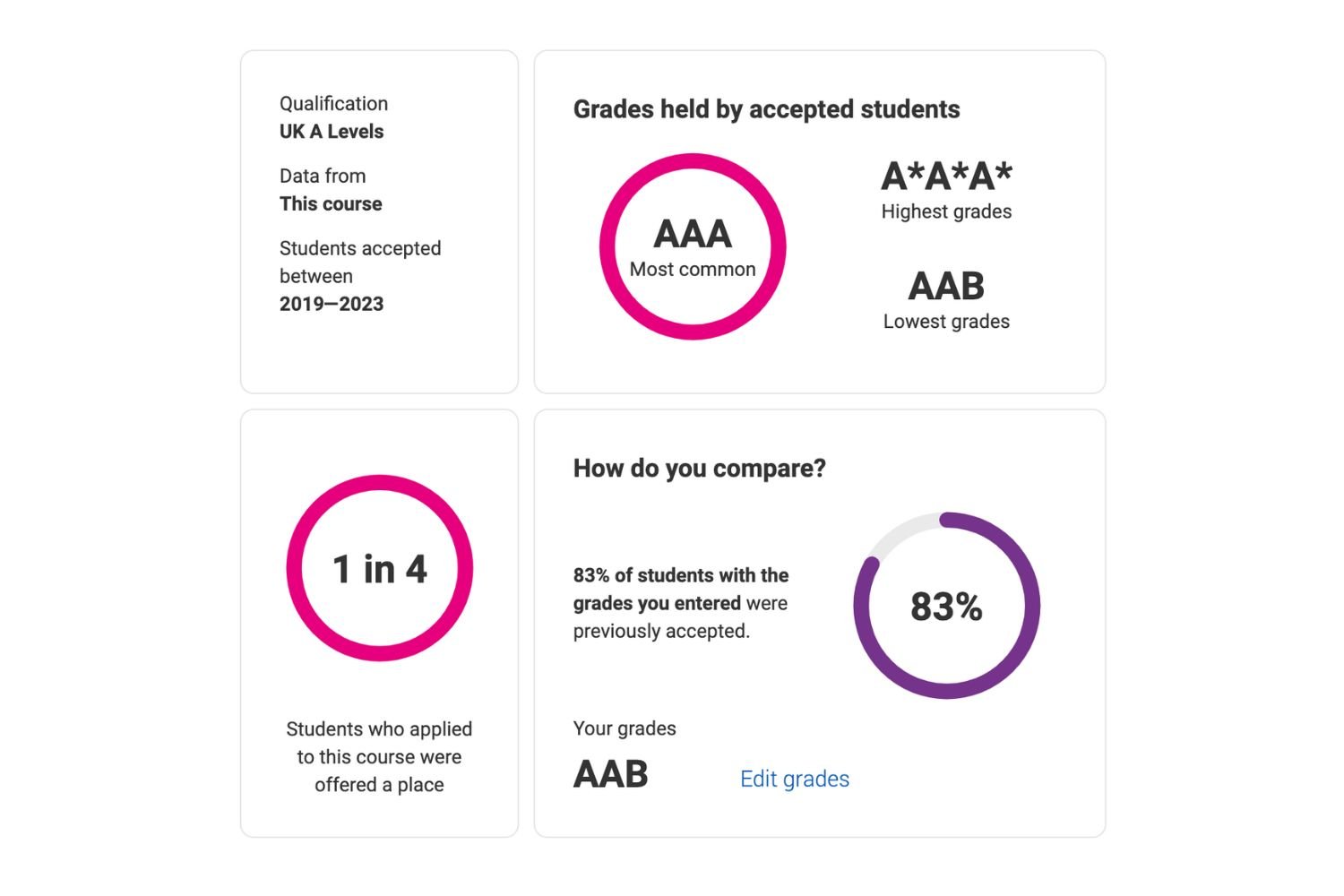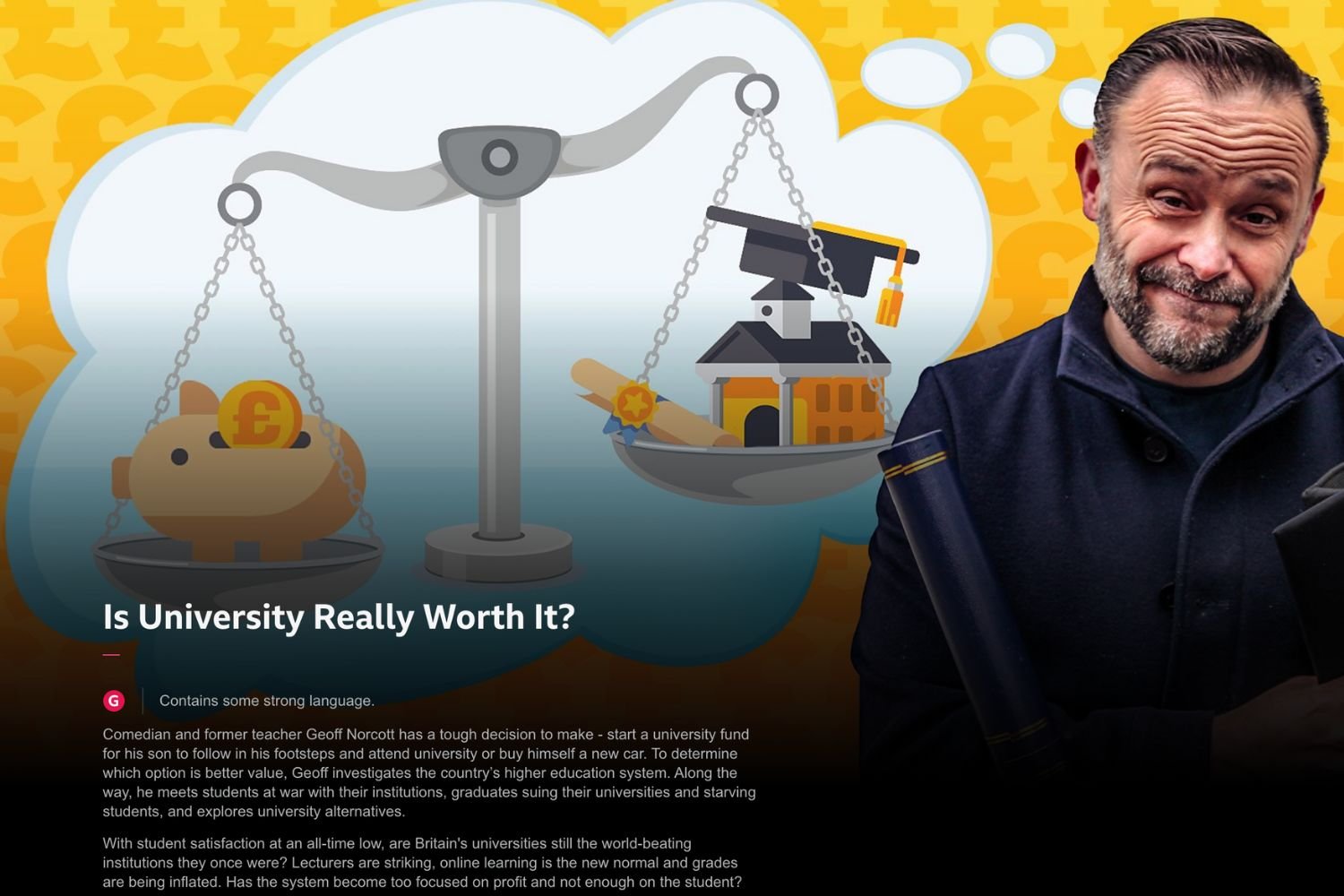Articles
Something new every week!
Search all articles

No regrets: How to choose the right subject to study at university
Nine out of 10 graduates would choose to do an undergraduate degree again if they could, with just one in 10 saying they would choose not to go to university if they had their time again.
Around half of the graduates say they’d choose the same subject.
But… four in 10 say they’d prefer to study a different subject.
This is according to brand new research by the Policy Institute at King’s College London.
That’s 40% of graduates who wish they’d studied something else, and 10% of graduates who wish they hadn’t gone to university at all!

Applying for highly competitive courses
Whether you are brand new to the university application process, or have been working in the education sector for as long as I have, you’ll undoubtedly have heard teachers, advisers and university staff talking about “highly competitive courses”.
It’s a term bandied about with little thought. On one hand teachers use it to make sure students take their applications seriously, and don’t make assumptions about their chances of getting into university. On the other, it is used by universities to make their courses seem more attractive; the more unattainable a course is, the more people want to get into it!
So, as students, applying through UCAS for the first time, how do you know which courses are genuinely “highly competitive”, and if they are, do you really need to do anything different with your application?

Wait… has the UCAS Personal Statement just been scrapped?
Earlier in the summer, just after the schools broke up in England, UCAS made an important announcement about the UCAS Personal Statement.
If you just looked at the headlines, you’d think that the Personal Statement had been banished forever. But in truth the Personal Statement is not being scrapped at all; it’s being reformed and restructured.
And it’s not happening immediately either.
So, what is the truth behind all those misleading headlines?

Top ten tips for results day and Clearing
For some of you, who have taken IB or BTEC, you’ll already have your results.
But for most students planning to go to university this year, your results day is just around the corner. For students from Scotland, you’ll get your results next Tuesday (6th August), and for A-level students, you’ll get yours the following Thursday (15th August).
This makes NOW an exceptionally good time to start preparing for the day, and having a plan in place in case things don’t go quite as expected.

Summer next steps
We heard from James Clear (author of Atomic Habits) the other week, that “You don't need to have it all figured out. You just need to know your next step”.
As you finish your school year and head into the summer break, you are probably caught right in the middle of a dilemma: On one hand you are tired, you want a break, and you really don’t want to think about school or university. On the other hand, the fact that you aren’t 100% sure about what you are going to do next, and the pressure from parents and teachers to get some decisions made, or some back-up plans in place, is stressing you out.
So, how do you square this dilemma?

Your university application timeline, with key dates for 2026
Are you about to embark on your university applications for entry in 2025?
If so, this timeline is exactly what you need to help you get your head around the process.
I’ll give you all the key dates and deadlines, suggestions about what you should be considering and when, plus links to loads more advice and support for each stage of the process.

Is “Find your passion” really a good way to choose a course?
It’s advice that is as old as the sun: “Find your passion, and you’ll never do another day’s work in your life”.
Or when you are heading off to university “Choose a course that you are passionate about”.
But, most careers advisers nowadays would say that such advice is deeply unhelpful. It creates the expectation that every young person should have found their passion. And since most of you simply haven’t found your passion while still at school, it just creates unnecessary pressure on you. Which in turn just makes you freeze; unsure of how to progress and how to choose what to do next.
However, perhaps there is something to be said for working out ways to explore your potential passions; how to find challenges, industries, and roles that might feel more like you are making a difference, and less like you are doing a job.
So how can you go about exploring what yours might be?

New UCAS historical entry grades data: Just how useful is it?
For the very first time UCAS have introduced information on their website that attempts to show you what grades students actually had when they entered different courses, rather than just showing the university’s published entry grades.
It turns out, you see, that nearly 50% of students get into their course with qualifications below the level of those universities published by the universities.
So when a course says you need AAB to get in, it turns out, you don’t!
This new data is aimed at making this all a bit clearer and more transparent, so that you can make better decisions about which courses to apply to.

BSc, MA, MBChB? I’m so confused!
Whenever I hear a university presentation in a school, I am struck by just how much jargon we use. Listen to any presentation about studying Medicine, and you’ll hear them talk about MBChBs as if it were the most normal thing in the world.
The reality, of course, is that while a select few people know that an MBChB is shorthand for a degree in Medicine, the number of people who know what it actually stands for is vanishingly small.
If you are one of those people, you have no need to read any further. However, if you are currently starting out your search on UCAS and are finding yourself baffled by the weird and wonderful array of degree titles and wonder what they all mean, this article is for you!

Building your super-skills
We all know that university is about gaining knowledge, but it's also about building up skills.
I wrote some months ago about the changing world, and the skills that the World Economic Forum believes will be crucial in the near future (see here).
But are there such things as universal skills; transferable skills that will always be useful, regardless of the economy, AI and changes in the environment?
I think there are, and the closest thing I have found to it is a simple list of ten skills identified a couple of years ago in the careers section of indeed.com.

How (and why) to build slack into your life.
I read a LinkedIn post the other day about building ‘slack’ into our lives, by a growth and performance consultant called Dr Mark Thorley.
In his post he talks about how we, as a society, seem to be all consumed with doing more. We constantly strive to be our best selves whether at work or in our personal lives.
Work hard, play hard, do more, go on better holidays, get a bigger car, spend more, get a bigger house, a bigger mortgage, and a bigger debt on our credit cards.
And what this all really comes down to is that we constantly get stressed simply trying to meet the expectations of others.
And yet, those who seem to be the very most successful at surviving in times of uncertainty, and can thrive when things go wrong, are those who have managed to build a little ‘slack’ into their lives.

Applying for student accommodation
So… you’ve had your university offers, you’re making your final choices, and your mind turns to that most practical of issues: where to live.
Heading to university is one of life’s biggest changes, and it's in no small part because most of you will be heading off to a new location and finding a new home to live in.
You’ll have all heard about halls of residence and student flats, but how does it all work in practice? What are your options and when do you need to apply for them?
If you have any of these sorts of questions on your mind right now, then read on…

Geoff Norcott: “Is university really worth it?”
This week I watched the BBC documentary “Is university really worth it?” by Geoff Norcott, questioning whether he should be encouraging his son to attend university.
It really struck a nerve.
You wouldn’t expect me to be too sympathetic to his views. Geoff Norcott, you see, is that right wing comedian from The Mash Report. I saw him do live stand-up once. He had to follow James Acaster, who did the most devastating takedown of right wing comedy that I’ve ever seen. Awkward.
And yet…

Setting and managing your budget
Last week we looked at the basics of student finance; tuition fees, student loans, and other sources of funding. This week we look at the other side of finance; what will you be spending your money on, and how to manage it.
Just like last week, this is not an exciting subject, but few matters are as important as finance when it comes to your studies and your wellbeing. You’ll know from my previous writing, that I don’t believe that money in itself can bring you happiness. However, a lack of money, or the mismanagement of money, can definitely bring misery. And with the amount of money that you are likely to be living on as a student, this is a major risk.
So… today we talk about financial planning. Firstly, how to work out what you need, how much funding you will receive, and how you will make up the shortfall. And secondly, how to manage your money over the course of the year.

Fees, loans and grants
So… you are nearly there! You are making your final decisions about where to go to university this year, and at the back of your mind is that nagging feeling that there is something still to do.
And it’s something important.
Yep, finance and funding: tuition fees, loans, scholarships, grants and budgets. The stuff that no-one really wants to deal with, but which underpins everything.
So this week and next, we’ll look at financing your time at university.

Resilience and Stoicism: what they are and why they matter
Last month, I wrote all about parental pressure and finding happiness in work.
I then received a lovely reply from another education consultant and adviser. He said that he would add, for the parents out there, that “aside from a decent paying job in an industry you care about, happiness across the lifespan is essentially a by-product of resilience” and that for this “stoic philosophy will do the job”.
He was so spot on with this comment that I just had to follow-up with a quick look at both resilience and stoicism, to further understand them, and why they are so important for your life ahead.

Why are some universities so ridiculously hard to get into?
Whether you are applying to university yourself, or are helping and advising students, you’ll have all heard the same stories: a student predicted A*A*A*, with an excellent Personal Statement and Reference gets rejected from a top university. Come A-level results day, some of these students will find themselves with no offers at all, and might even find themselves as a headline in the press.
But why is this? Why are amazing, talented students so frequently finding themselves rejected by universities, when there seems to be nothing wrong at all with their applications?
Well, to understand, we need to go back a few steps.

UCAS Extra and Clearing: A failsafe for the unexpected
Sometimes, the UCAS system might seem a bit clunky and a bit restrictive, and for many students it seems a bit complicated. But in the main, it seems to work for most people, with some 384,000 students ending up at their firm or insurance choices last year.
Yet each year, there are a whole bunch of students who the main process doesn’t quite work properly for. That’s where UCAS Extra and Clearing come in; to provide you with a failsafe for when the unexpected happens.
You might not plan on using either of these, but trust me, it's well worth spending the next five minutes reading all about them, so that you have that failsafe ready, should you need it!

Five to two: Making your final UCAS choices
As I write, many of you will be receiving offers from your chosen universities. It’s a nervous time, and while some of you will be getting offers promptly within days of applying, others may need to wait weeks, or even months for a decision.
So when you get all these decisions from universities, what happens next? Well, the response is now up to you.
The universities will all be hoping you’ll choose them. They’ll be sending you emails, inviting you to visit days, perhaps even sending you a brochure or two in the post. But the reality is that the power now rests with you. You get to choose which offers to accept!
So, how does it all work, and what should you be thinking about as you accept your offers?

Parental pressure and career happiness!
Back in October, I wrote an article about How not to become a university ‘drop-out’, and within it, discussed pressure. In particular, how much pressure is too much pressure?
I see it in every school and every university; students who just feel overwhelmed by the pressure they feel to perform well, and to choose a career that will bring them success. And while some of that pressure will come from teachers, and some from within yourselves, there is no doubt that much of the pressure you think you are under, comes from parents.
And so I thought it might be worth having a quick think about what this pressure really is, where it comes from and whether it's real.
